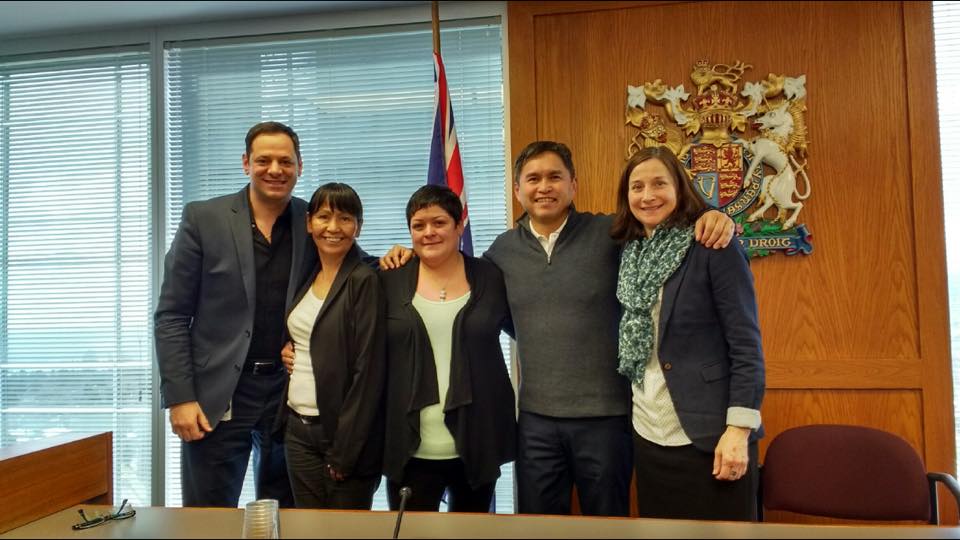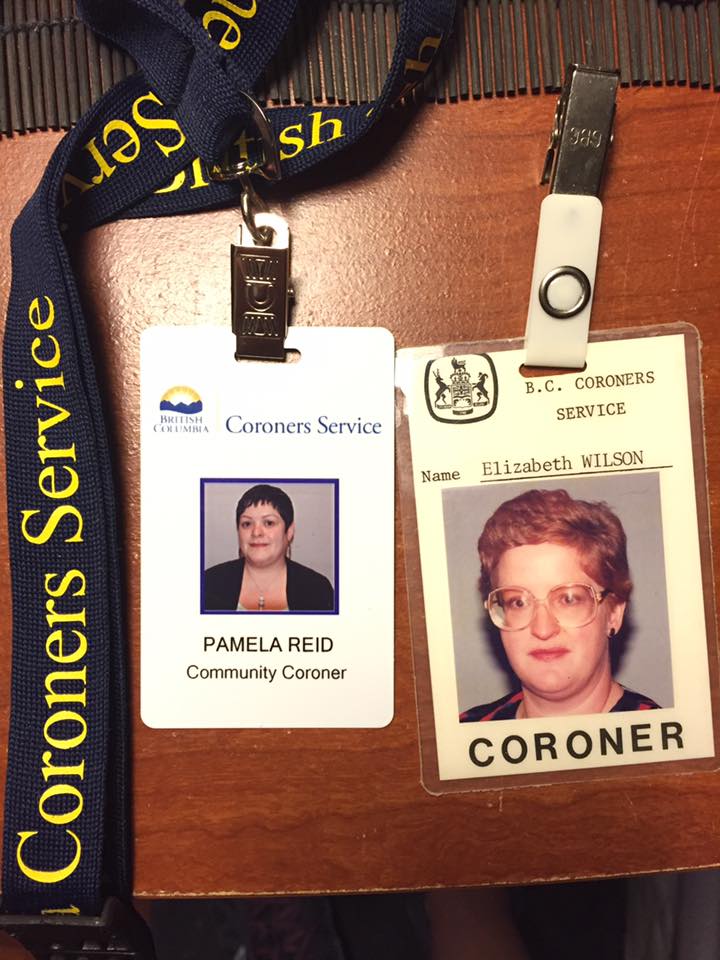
L-R: Vincent Stancato - Deputy Chief Coroner, Eleanor Cooper - Community Coroner, Pamela Wilson - Community Coroner, Joe Gallagher - FNHA CEO, Lisa Lapointe - BC Chief Coroner
Pamela Wilson, a member of Heiltsuk Nation (Bella Bella), never expected to become a coroner. Self-described as squeamish, she was nonetheless drawn to the profession later in life by her strong belief that coroners working in community require a greater cultural understanding and humility—areas that she could advocate for and bring to her own practice.
"Death has always been a part of my life. Through childhood, the way of approaching it, death has always been normal to us. We went to funerals as children and protocols around protecting children were often practiced and explained to ensure our understanding and wellbeing. Death is part of a continuation of the next piece of work in the spirit world."
Although her career background is in psychology and politics, Pamela was more familiar with death protocol work than most. Indeed, the coroner profession runs in her family. Her mother, Elizabeth Wilson, a nurse, did coroner's work during Pamela's late teens and early twenties and two of Pamela's uncles, Michael Wilson and Alan Tite, also served as coroners in later years. Eventually the role was left vacant for over a decade.

Coroner IDs for Pamela Wilson and her mother, Elizabeth Wilson
Pamela notes that in small communities, the personal nature of the work can be challenging, as you will likely know the deceased. Incidentally, her mother quit working as a coroner following a string of suicides in the community. As a nurse of 40 years in Bella Bella, her mother had helped "birth" those same young people who took their lives; the job had become too personal and painful.
Yet it was a tragedy within Pamela's own family that made her consider the profession for herself. Her family recently lost an infant, who passed away in Bella Bella. When Pamela helped liaise with the dispatched coroner, she realized that ensuring cultural safety in the coroner's practice was a way to contribute to the wellbeing of her people. The event sparked her interest in helping her community through such losses.
"It is a privilege to step into possibly the most difficult time in someone's life. Having the opportunity to provide peace and in a respectful manner—by knowing the ceremony and traditions to embrace death," says Pamela. "I wanted to be able to support my people at one of their greatest times of need. I wanted to contribute in a way that minds the gap between the western approach and First Nations traditions."
Pamela graduated as a community coroner in March 2016, following a training program consisting of multiple online courses, a week-long, intensive training session with the coroners service and exposure training at the Northern Regional Office, where she shadowed and worked with the Northern team for a week. Despite the intensity of training, she says she was surprised by how holistic the program was and felt supported and mentored throughout. The collaboration between the coroners service and First Nations, through FNHA, also contributed to Pamela's desire to be a part of the service.
When asked why she thinks it's important for First Nations people to become coroners, she notes, "A First Nations coroner has a cultural understanding, which helps to mitigate disrespect and misunderstanding—being humble and respecting peoples' processes. First Nations are much older than Canada—these practices and ways of life have always been."
As a First Nations person, Pamela understands the cultural and spiritual needs of the people she works with and can quickly build trust with those she serves; it's this connection with her community that ultimately makes the work so meaningful.
The BC Coroners Service is currently hiring for Community Coroners in a number of communities throughout BC. Community Coroners are not full-time employees of the government but rather attend sudden and unnatural deaths in their communities on an as-and-when needed basis, performing a valuable service for their communities and the families and friends of the deceased. They are invaluable members of the BC Coroners Service team. For further information about the background and qualifications for Community Coroners and to apply, please see the website at: http://www2.gov.bc.ca/gov/content/life-events/death-and-bereavement/coroners-service/job-postings
The Coroners Service is currently hiring for positions available in:
McBride/Valemount
Haida Gwaii/Queen Charlotte Islands
Penticton (two positions available)
Williams Lake
Lower Mainland
Squamish/Pemberton/Whistler
Sunshine Coast - Gibsons/Sechelt
Closing date for applications is: June 3, 2016

